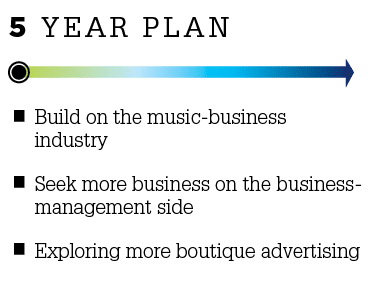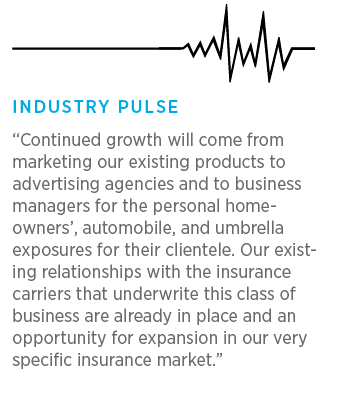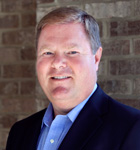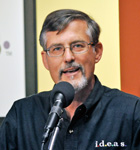 My father started this business in the ’50s, mainly insuring illustrators, photographers, graphic designers, and Japanese restaurants and trading companies based in Japan. Over the years, we have expanded our niche into the entertainment industry to include post-production companies, television/commercial producers, equipment-rental companies, and independent filmmakers. It is an expansive and lucrative industry that consistently changes—it is just the nature of the beast. It is an industry built on deadlines and 11th hour emergencies. But one thing that the company has always done is to remain committed to our principles and to our own standards. We will not be swayed to take shortcuts or to sell an insurance product that does not measure up to a level of coverage that I would want sold to my company if I was the consumer. This company has been around for over 50 years based on that very simple ideal.
My father started this business in the ’50s, mainly insuring illustrators, photographers, graphic designers, and Japanese restaurants and trading companies based in Japan. Over the years, we have expanded our niche into the entertainment industry to include post-production companies, television/commercial producers, equipment-rental companies, and independent filmmakers. It is an expansive and lucrative industry that consistently changes—it is just the nature of the beast. It is an industry built on deadlines and 11th hour emergencies. But one thing that the company has always done is to remain committed to our principles and to our own standards. We will not be swayed to take shortcuts or to sell an insurance product that does not measure up to a level of coverage that I would want sold to my company if I was the consumer. This company has been around for over 50 years based on that very simple ideal.
I honestly believe that doing what is in the customers’ best interest is the best way to conduct business. As you might imagine, there are a lot of personalities involved in the entertainment business and being sensitive to the needs of all parties involved in the process of bringing a project to conclusion is essential to having a shoot proceed without incident and within budget. Since production does not always go as planned it is important that there are contracts in place that allocate the company responsible for the cost overrun, injury, or loss. Having a solid knowledge of the industry-trade practices is a must when reviewing the corresponding contracts amongst the various parties. It can be challenging to get everyone to agree to the terms, but it is easier if you remain bipartisan and keep it fair and equitable for everyone.
 I have a legal degree in addition to my bachelor’s in finance and accounting. Often, I find myself in a position of a negotiator—whether it is in negotiating a claims settlement or the terms and conditions of an insurance policy. I am a middle man and I work very hard at being consistent and an advocate of my client’s interest. This is an industry where there has to be constant compromise and creative solutions proposed to keep things moving in a forward direction and getting the project completed. There has to be a high level of trust and confidence in the insurance broker because as most people are aware, insurance policies are long and filled with [legal speech] that not everyone understands. Explaining coverage and setting the correct expectations for clients is what I believe separates insurance brokers.
I have a legal degree in addition to my bachelor’s in finance and accounting. Often, I find myself in a position of a negotiator—whether it is in negotiating a claims settlement or the terms and conditions of an insurance policy. I am a middle man and I work very hard at being consistent and an advocate of my client’s interest. This is an industry where there has to be constant compromise and creative solutions proposed to keep things moving in a forward direction and getting the project completed. There has to be a high level of trust and confidence in the insurance broker because as most people are aware, insurance policies are long and filled with [legal speech] that not everyone understands. Explaining coverage and setting the correct expectations for clients is what I believe separates insurance brokers.
Word of mouth is how this industry grows. Everybody knows everybody in some way, so again, it is important to be consistent, fair, to do a good job and to only sell policies with insurance carriers who have a history of paying their claims. I have said it before but being correct in the advice given to clients and selling coverage with an insurance carrier who honors their commitments is a key tenant for success. I expect that of myself, so naturally I also expect that of my account executives and every valued employee at Taylor & Taylor.
The industry is small—there are about 10 other insurance brokerages that cater to the industry. It takes years to build a solid reputation and only a few mistakes to ruin what we have spent two lifetimes building. I will never be pushed to do something that is wrong. I rarely lose clients. I attract them because of the way that we have done and will continue to do business. Taking a counter position with the hopes of securing a new relationship or defending a wrong position is not an option for me.
I make it a rule to hire bright people and to train my staff from the ground up. We have 50 employees and more than half of them have been here for more than 20 years. I find smart, bright, and talented individuals and train them under the same code I hold myself to. If I don’t feel that the level of integrity is there, they don’t get in the door. I firmly believe in giving my people opportunities to move up in the organization, promoting from within, and building people up. The longevity of the employees here shows that. You have to love what you do to really be great at it. And I love what I do.


